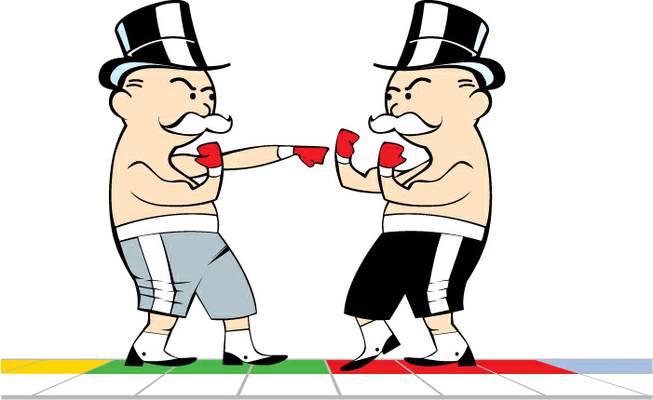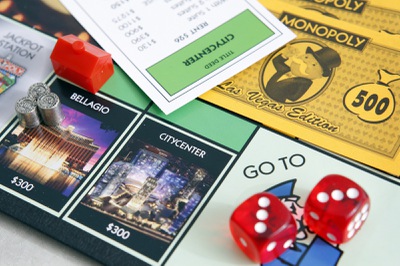Tuesday, Nov. 10, 2009 | 2 a.m.
Sun Coverage
Sun Archives
One of the biggest tussles involving Las Vegas real estate has resolved itself.
When the dust settled, real estate appraisers decided that Caesars Palace, Bellagio and CityCenter deserved to be situated in the same high-value neighborhood, Planet Hollywood was, maybe surprisingly, deemed more valuable than the Mirage, and the Stratosphere was located in a more valuable section of town than New York-New York.
There may be some squabbling among Vegas aficionados over whether these assessments of relative value are accurate. The resorts, though, are just happy to have won a place at the table — or, more specifically, the game board.
They are, after all, in the gaming business.
Welcome to the updated Las Vegas edition of Monopoly, which features some of the biggest names on the Strip.
City-branded games were among the first variations of the original 1930s-era board game that introduced generations of Americans to the basics of cutthroat capitalism. Only the Las Vegas and New York editions of Monopoly have survived, as the company that develops themed Monopoly games — USAopoly of Carlsbad, Calif. — turns to entertainment and pop-culture themes.
When the company decided it needed to update the Las Vegas game to include CityCenter, some shifting had to occur among the other properties on the board.
There was, of course, much competition to land the two most valuable spots on the game board — the ones that, in the conventional game, are given to Boardwalk and Park Place.
The game manufacturer found a peaceful solution: Boardwalk would become the Strip, Park Place would become downtown Las Vegas.
The resorts were OK with ceding board-placement decisions to USAopoly, because they want their names exposed to millions of Monopoly game players.
“Monopoly is a household name, and to be part of the new Las Vegas-themed edition is a great opportunity,” says April Chaparian, who oversees the use of MGM Mirage’s brands as director of intellectual property.
In Monopoly-land, the most expensive single property is Caesars Palace (sale price: $320). CityCenter, the $8.5 billion resort complex opening next month, goes for $300, the same as Bellagio.
The cheapest properties are Circus Circus and Imperial Palace, which cost $60 each.
In a case of art imitating life, properties owned by MGM Mirage — the Strip’s largest operator and Nevada’s largest private employer — occupy nine of the 20 individual hotels that can be acquired in the game. Harrah’s Entertainment-owned properties occupy seven spaces. Besides those are Planet Hollywood, an owner-operated property that isn’t part of a chain, the Stratosphere, whose owner also has smaller casinos in Nevada, and Station Casinos-owned Red Rock Resort and Green Valley Ranch, which aren’t anywhere near the Strip or downtown.
Wynn Resorts’ Wynn and Encore and Las Vegas Sands’ Venetian and Palazzo are conspicuously absent from the board, as those companies declined to participate. (True to life, they wanted premier placement and declined to be grouped with lesser peers.)
While the Las Vegas Convention and Visitors Authority has taken pains to market Las Vegas as a vacation destination for people who don’t necessarily gamble, gambling takes center stage in Monopoly-land.
The pewter game tokens come in the shape of a wad of cash, stacks of poker chips, a hand of blackjack and a roulette wheel. Others, like the miniature wedding chapel and a showgirl, also are age-old stereotypes.
Instead of “Chance” and “Community Chest” cards, the game embraces gambling images — especially slot machines — in cards labeled “Jackpot Station” or “Reel Estate Tycoon.” Most of the cards are gambling-related, from slot machine winnings to crimes that result in a quick trip to “jail.” (“Rigging a game” disqualifies the player from passing Go and collecting $200.)
Instead of rail lines, players can acquire four transportation services — airlines, taxis, limousines and the monorail. Two stand-alone tourist attractions — Hoover Dam and the Liberace Museum — can be purchased for $150 each.
Players who land on the “hotel tax” square must fork over $200; a poker buy-in costs $100.
You can pull the random prize fight ticket ($50), shotgun wedding (pay $50 to each witness) or tip a showgirl ($100).
Gambling is part of the game of Monopoly, which favors aggressive action rather than conservative wealth-building. Players win by owning everything and bankrupting rivals.
But the similarities with Vegas and the Strip, which would more accurately be described as an “oligopoly,” end there.
There’s no Chapter 11 in this Monopoly-land, only liquidation and the finality that comes with being shut out of the game. Your banker is forced to lend you cash so long as you own property (and can issue more money simply by writing on ordinary paper if the bank runs dry).
If only.



Join the Discussion:
Check this out for a full explanation of our conversion to the LiveFyre commenting system and instructions on how to sign up for an account.
Full comments policy